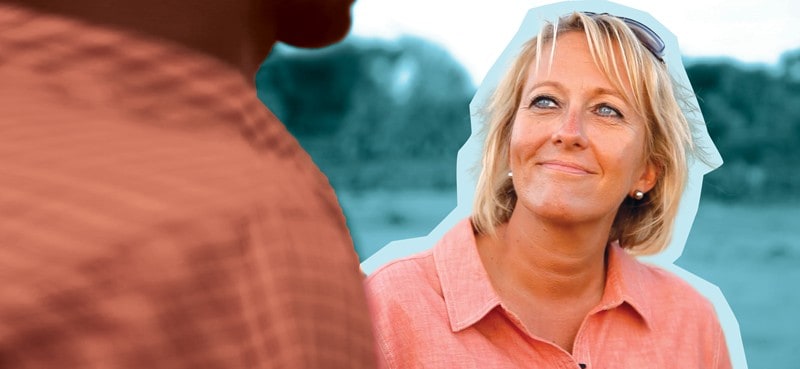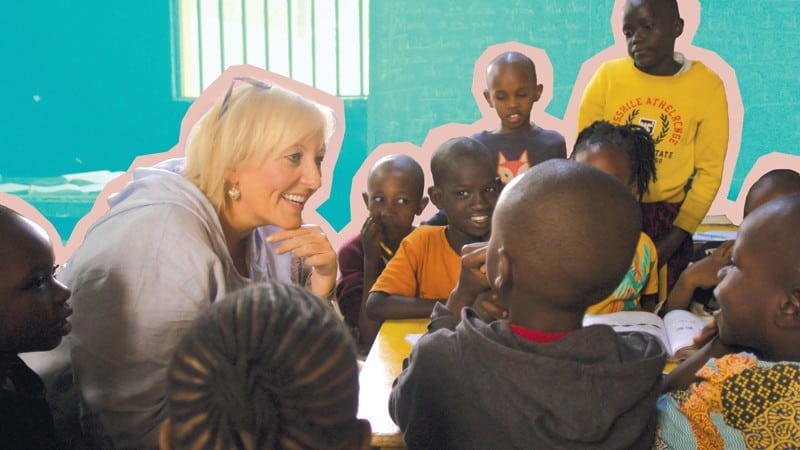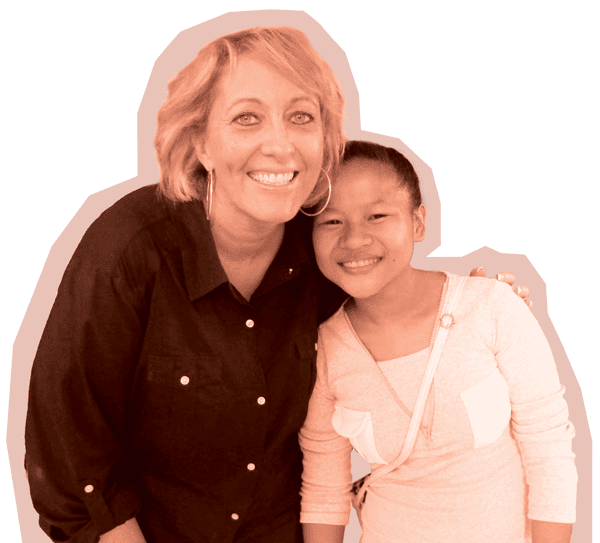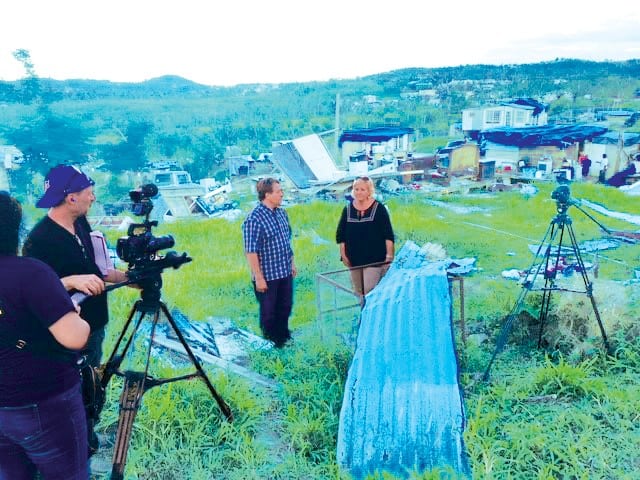Cheryl Weber becomes Director of Crossroads Cares
Q&A By Amy Laforet, Director of Marketing and Communications

I first met Cheryl Weber in 2005 when I joined Crossroads. She was the supervisor of 100 Huntley Street’s field reporting team, and I didn’t take long to notice her dedication, passion, and steadfast spirit. I saw her coach many young people in the ways of journalism, and it was clear she had earned this privilege. Like many 100 Huntley Street viewers, I’ve lived vicariously through Cheryl’s extraordinary adventures diving the Great Barrier Reef, climbing Mount Kilimanjaro, and exploring the Holy Land with our Crossroads partners! Cheryl has also led us into dark places of great need and been a witness for compassion and practical love that transforms lives. When I heard Cheryl was picking up the Crossroads Cares mantel, I knew we needed to venture into the heart of the woman who has dedicated her life for such a time as this.
A: When did your heartbeat for missions begin?
C: My first real memory of being touched by the suffering of the world was during the Ethiopian famine of 1984, when more than a million people died. I remember how Michael Jackson and Lionel Richie wrote the song “We Are the World” which brought together well-known musicians of all genres to raise funds for food for those who were starving. I saw how powerful it could be when the world gathers around one cause with one voice. I learned that global change could happen through compassionate, motivated action.
Years later, at my Christian University, they sent out invitations for people to join our mission teams working around the world over the summer. I would watch their videos of the impact, cry and pray. I told God that if He wanted me to go, please open a door. I needed to work in the summers to help pay for school, so I knew it would take a miracle. I was both touched and terrified. The thought of serving overseas under challenging circumstances frightened me. But I was also filled with compassion and drawn to the idea of helping those who were suffering.

A: You are an expert world traveller. Was that always a dream?
C: Most people would be surprised to find out that I never desired to visit the developing world. Throughout my childhood, people would pray for me and tell my parents that I had a call on my life to go to the nations of the world. So, I always had the idea but I thought it would be safe, comfortable travel. Perhaps I could speak at conferences? Years later, I was in a church service where they asked people to come to the front if they felt a calling to the nations of the world. I knew that I needed to answer that call. The speaker then challenged us to remove our shoes and commit our feet to God. I could hear God whispering to me these words: “dusty corners of the world, remote places where no one goes,” and I was appalled. Those words really scared me. I didn’t want to take off my shoes if that’s what it meant. Yet I had given my life over to God, to obey whatever He asked of me. After battling within, and despite the fear I was feeling, I decided to say ‘yes’. But I asked God for one thing. I said: “You own my life. If this is really what you have for me, then I ask you to change my heart. I don’t want to be someone reluctantly doing your will, complaining the entire way. You own my heart – please give me a love for this work.” When I finished that prayer, I took off my shoes, dedicated my feet to God, and wept from the depths of my being. A battle had been won. God owned my feet.
A few years later, I lived in Germany for the summer, working for Crossroads at Expo 2000. I backpacked across Europe at the end of my time there and fell in love with global travel. When I returned to Canada, I was barraging heaven for an opportunity to live and work overseas. I had the chance to do some amazing global reporting occasionally, but the door remained largely closed for almost a decade. God had changed my heart in answer to my prayer, but it was not yet His timing for my feet to follow the path He had shown me many years before.
My first international reporting trip occurred in 2005. I had travelled to Cuba on vacation and connected with a Canadian named Tony, who had a travel agency there. He gave people a good deal for their vacation and had them bring much-needed aid to the Cuban church. He would deliver it to remote areas where no tourists ventured. I brought aid to him on that vacation, and he offered to show me the real lives of Cubans. I spent a day with him outside of the tourist resorts, and the impact of seeing the desperation of the people rendered me speechless. I could hardly process the suffering he shared with us. I had to do something.

When I came home, I pitched my boss at 100 Huntley Street to allow us to go undercover into Cuba and tell the story of this amazing Canadian who was risking so much to help people. He agreed and soon my cameraman Mike and I were undercover in Cuba. I told Mike that we could never speak of our true intention to be there while we were on the island as spies were everywhere. We would likely be fine, but the local people we were partnering with could be in immediate danger from the communist government. My co-worker found this especially difficult as we saw heartbreaking scenes every day, but he couldn’t process them with his family (who accompanied him to help our cover story). He came to talk to me about it with discouragement, but we couldn’t take the risk.
As I prayed afterwards about this issue, a picture popped into my mind. I saw a beautiful flower opening up and heard the words: “You were made for this”. I didn’t fully understand what God meant, but I knew I had somehow been equipped for situations like these. It would be years before I truly understood God’s call on my life for justice and global care.
A: Is there someone who inspired you in this work?
C: Like so much of the world, Mother Theresa inspired me personally. But I’d also have to say that all our overseas partners have deeply touched me in this work. The people we work with are true heroes and worthy of the utmost admiration. They sacrifice and serve on a level that most of us could never imagine. Yet almost no one knows their name. They truly live out the exhortation of Luke 12:33: “Sell your possessions and give to the poor. Provide purses for yourselves that will not wear out, a treasure in heaven that will never fail, where no thief comes near and no moth destroys.”
A: What are some memorable moments from the mission field?
C: In 2004, I watched a Dateline NBC Documentary titled Kids for Sale. It told the story of young girls who were sex trafficked to foreign men. The story sickened me. I began to pray three specific things for the little girls on that video: that they would be rescued, come to faith in Jesus, and have their hearts and souls healed. Fast forward through a long story to 2009 when Crossroads Cares sent me to Cambodia to report on our work rehabilitating trafficked girls with the NGO Ratanak International. Suddenly, I found myself sitting across from girls in their pre-teens who were the very girls I had prayed for in the NBC documentary. They were rescued, had faith in Jesus and were on a journey of healing. I could scarcely take it in. God had literally placed me in front of answered prayer. I knew without a doubt that when we pray for the issues we see on the news or in the world, God hears our prayers. He wanted me to know that beyond a shadow of a doubt. It was one of the most impactful moments of my life.

A: What wisdom from Dave Shelley, your predecessor of 20 years, will you carry forward?
C: I’ve learned so much from Dave. My biggest lesson is that you can be sincerely motivated to help those who suffer, but that doesn’t mean you are really changing the situation with your efforts. True compassionate care combines the motivation to make a difference with real expertise about doing humanitarian work well. If possible, it involves local, Indigenous partnerships because they know what works in their context. They will still be there long after you’ve gone and continue to minister to the hurting. It also involves finding ways to empower people to care for themselves, instead of creating a dependency culture. I often reflect on the idea that God doesn’t just care for our physical needs, but our emotional and spiritual ones as well. The need for dignity is so essential for healing. Dave has always told us that we are working ourselves out of a job. We’ll help this community of people and then move on to others who need the help. Sustainability, local expertise, and dignity make a huge difference.
A: What are you looking forward to in this new role?
C: I really have a strong desire to build on the solid foundation that David Shelley has enacted over his 20 years and continue to grow the work. The world is being shaken to new levels, and people need to see followers of Jesus being His hands and feet in the world. I aim to reach new audiences through digital engagement and social networks. But overall, I want to empower our partners on the ground to reach and help more people. It’s as simple as that.
Cheryl Weber is a regular co-host on 100 Huntley Street where she provides updates from Crossroads Cares. You can learn more at crossroads.ca/cares

